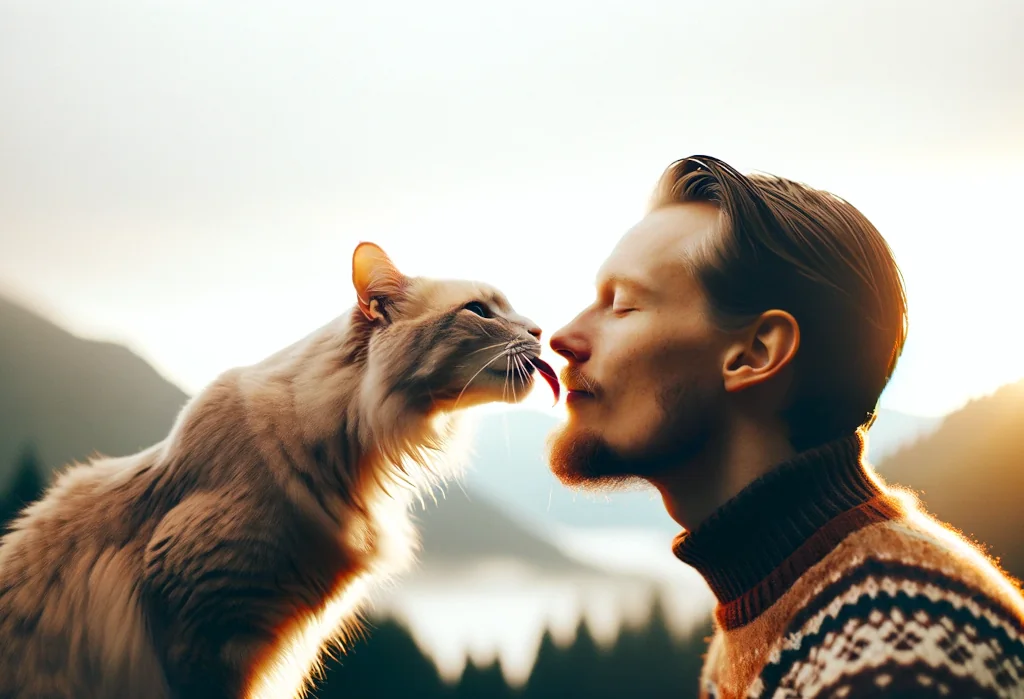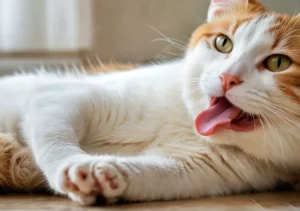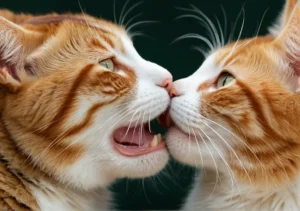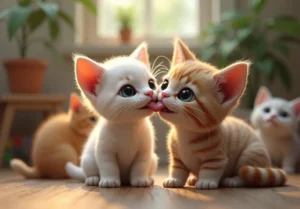You know you’re truly a cat person when a tiny, damp nose touch is followed by a scratchy tongue, transforming a peaceful moment into a bizarre beauty treatment. Yes, your feline friend has chosen your nose as their favorite lick spot. But why your nose, of all places?
In this blog post, we promise to unravel the mystery behind your cat’s peculiar choice of licking your nose, ensuring you understand the affectionate, quirky, or even health-related reasons behind this behavior.

Quick Takeaways:
- Cats lick as a sign of grooming and bonding, with nose licking indicating a strong affection and scent exchange with their owners.
- Sudden increases in nose licking can signal health issues in your cat or changes in your health that your cat senses.
- Mitigate health risks from cat licks by maintaining hygiene, observing your cat’s behavior, and ensuring regular vet visits for your feline friend.
Why Do Cats Lick in the First Place?
Cats are fascinating creatures with a laundry list of behaviors that both endear and perplex their human companions. One such behavior is licking. But, why do cats lick everything from themselves to inanimate objects, and of course, us? At the heart of it, licking is a grooming habit. Mother cats lick their kittens to clean them and stimulate their little bodies to function correctly. As they grow, kittens mimic this behavior, turning it into a lifelong self-cleaning ritual.
But it’s not all about hygiene. Licking is also a way for cats to bond. When your feline friend licks you, it’s not just grooming they’re after. They’re mixing their scent with yours, creating a communal aroma that screams “family.” It’s their way of saying, “You’re part of my clan.”
Is Nose Licking a Sign of Love?
When your cat zeroes in on your nose, it might seem like a quirky choice, but it’s packed full of affection. The act of nose licking serves as a strong scent exchange, a behavior deeply wired in a cat’s way of bonding. By targeting your nose, a hotspot for scent, your cat is essentially saying, “I love you,” in one of the most profoundly feline ways imaginable.
This behavior traces back to their earliest moments in life. Kittens nuzzle and lick their mother’s face and vice versa as part of their bonding process. It’s a sign of trust, comfort, and companionship. When your cat treats you similarly, it’s clear evidence they view you as an integral part of their family unit. Additionally, your unique smell is appealing to them, and licking helps them feel closer to you.
Could My Cat’s Nose Licking Be a Health Indicator?
While often a sign of love and affection, frequent nose licking can sometimes wave a red flag. It’s essential to understand that cats are sensitive creatures, capable of picking up subtle changes in their environment and the people around them. If your cat suddenly ramps up the nose-licking behavior, it might be reacting to a change in your scent due to health reasons.
Here’s the catch – cats have an incredible sense of smell. They can detect chemical changes in your body that even you might be unaware of. Diseases like diabetes can alter your body’s scent, and your cat might be the first to notice. On the flip side, if the cat itself starts licking more frequently than usual, including your nose or any other surfaces, it could signal a health issue in them, such as dental pain or stress.
However , before you start worrying about every lick, consider other signs as well. Is your cat showing changes in appetite, behavior, or litter box habits? These could be more straightforward indicators of health issues. If your cat’s nose-licking is accompanied by other concerning signs, consult a veterinarian.
In short, while a cat licking your nose can be a sweet sign of their love and affection, it’s also smart to keep an eye out for unusual patterns that might indicate health concerns. Remember, you know your cat best. If something feels off, it’s always better to be cautious and reach out to a professional.
How Should I Respond to My Cat Licking My Nose?
When your furry companion decides your nose is their new favorite snack, it’s not just a quirk—it’s a sign of affection, grooming, or even a request for attention. Here’s how to navigate this sticky (literally) situation:
- Reinforce or Redirect: If you enjoy the affectionate gesture, gently pet your cat to reinforce the positive interaction. However, if it’s not your cup of tea, try redirecting their attention with a toy or move gently away. Avoid negative reactions, which could confuse your pet.
- Set Healthy Boundaries: It’s crucial to establish boundaries with your cat. If nose licking is off-limits, consistently redirect their behavior every time they attempt it. Consider using a firm but gentle tone to say “no,” and immediately offer an alternative form of interaction.
- Seek Advice When Necessary: If your cat’s licking behavior becomes obsessive or is accompanied by other concerning signs, consulting a veterinarian is a smart move. Sometimes, behavioral changes are the first indicators of health issues.
Remember, every cat is an individual, and what works for one may not work for another. Patience and consistent training will guide you towards a mutual understanding and respect between you and your beloved feline.
Are There Any Risks to Being Licked by My Cat?
Let’s face it, cat kisses can be both sweet and slightly worrying at the same time. Understandably, many pet parents wonder if there are any health risks linked to our cats’ loving licks. Here’s the lowdown:
- Allergic Reactions: Some people might find themselves allergic to their cat’s saliva. This can lead to itchy skin or even an allergic reaction. If you notice any rash or discomfort, it might be time to keep those kitty kisses at bay.
- Transfer of Bacteria: Cats explore the world with their mouths and can pick up bacteria along the way. While Pasteurella, common in cats’ mouths, is usually harmless, it can cause infection if it enters the human body through open wounds. The infamous Toxoplasma gondii parasite, although more commonly transmitted through handling cat feces, can also be present in saliva.
- Mitigating Risks: To enjoy your cat’s affection safely, consider the following:
- Keep it Clean: Regularly washing your face after a cat-kiss session, especially if you have open wounds, reduces the risk of bacterial infection.
- Observe Your Cat’s Behavior: An increase in licking, especially if it’s focused on your nose, could indicate anxiety or health issues in your cat. Keep an eye on their overall behavior and consult a vet if you notice anything out of the ordinary.
- Regular Vet Visits: Ensuring your cat is up-to-date with vaccinations and regular health checks can significantly reduce the risk of transmitting any unwanted bacteria or parasites.
And here’s a piece of advice that often flies under the radar: Mind Your Cat’s Diet. A cat fed on a healthy, well-balanced diet is less likely to carry harmful bacteria in its mouth. Plus, a nutritious diet contributes to your cat’s overall health and well-being, reducing the risk of disease transmission.
In conclusion, while cat kisses can carry some risks, with the right precautions, you can continue to enjoy these moments of affection safely. Understanding your cat’s behavior and maintaining good hygiene practices are key to ensuring both you and your beloved pet stay healthy and happy.
Alex, a passionate animal lover, has experience in training and understanding animal behavior. As a proud pet parent to two dogs and three cats, he founded AnimalReport.net to share insights from animal experts and expand his knowledge of the animal kingdom.




